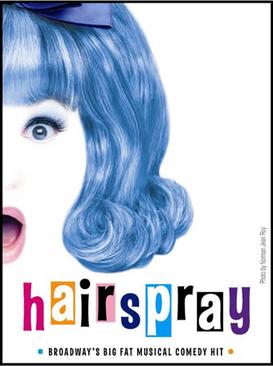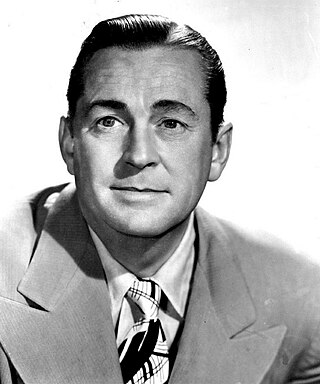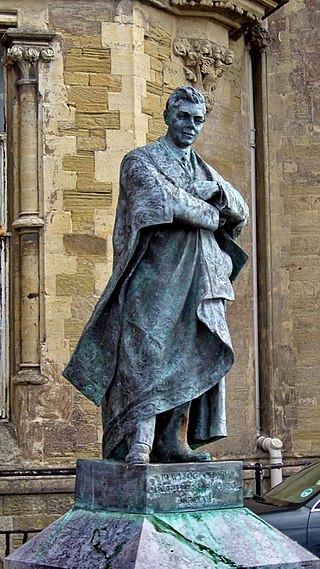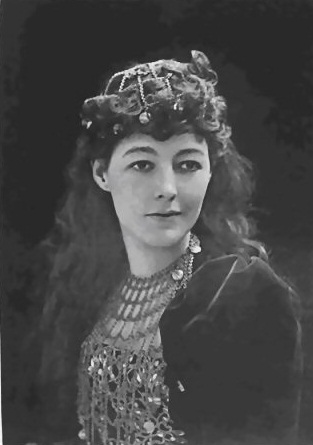Related Research Articles

Elsa Sullivan Lanchester was a British actress with a long career in theatre, film and television.

Hairspray is an American musical with music by Marc Shaiman and lyrics by Marc Shaiman and Scott Wittman, with a book by Mark O'Donnell and Thomas Meehan, based on John Waters's 1988 film of the same name. The songs include 1960s-style dance music and "downtown" rhythm and blues. Set in 1962 Baltimore, Maryland, the production follows teenage Tracy Turnblad's dream to dance on The Corny Collins Show, a local TV dance program based on the real-life Buddy Deane Show. When Tracy wins a role on the show, she becomes a celebrity overnight, leading to social change as Tracy campaigns for the show's integration.

James Howard Dunn, billed as Jimmy Dunn in his early career, was an American stage, film, and television actor, and vaudeville performer. The son of a New York stockbroker, he initially worked in his father's firm but was more interested in theater. He landed jobs as an extra in short films produced by Paramount Pictures in its Long Island studio, and also performed with several stock theater companies, culminating with playing the male lead in the 1929 Broadway musical Sweet Adeline. This performance attracted the attention of film studio executives, and in 1931, Fox Film signed him to a Hollywood contract.
Geraldine James OBE is an English actress. She has worked extensively on television, on stage and in film. She is known for her role as Marilla Cuthbert in the Netflix series Anne with an E (2017–2019) and as Queen Mary in the 2019 film Downton Abbey.

The Glass Slipper (1955) is an American musical film adaptation of the fairy tale Cinderella, made by MGM, directed by Charles Walters and produced by Edwin H. Knopf from a screenplay by Helen Deutsch. The music score is by Bronislau Kaper, the cinematography by Arthur E. Arling, the art direction by Daniel B. Cathcart and Cedric Gibbons and costume design by Walter Plunkett and Helen Rose.

Edward & Mrs. Simpson is a seven-part British television series that dramatises the events leading to the 1936 abdication of King Edward VIII, who gave up his throne to marry the twice-divorced American Wallis Simpson.
Mr Cinders is a 1928 musical with music by Vivian Ellis and Richard Myers and a libretto by Clifford Grey and Greatrex Newman. The story is an inversion of the Cinderella fairy tale with the gender roles reversed. The Prince Charming character has become a modern (1928) young and forceful woman, and Mr Cinders is a menial.
The Admiral's Men was a playing company or troupe of actors in the Elizabethan and Stuart eras. It is generally considered the second most important acting troupe of English Renaissance theatre.
Kelville Ernest Irving was an English music director, conductor and composer, primarily remembered as a theatre musician in London between the wars, and for his key contributions to British film music as music director at Ealing Studios from the 1930s to the 1950s.

George Joseph Edwardes was an English theatre manager and producer of Irish ancestry who brought a new era in musical theatre to the British stage and beyond.

The School Girl is an Edwardian musical comedy, in two acts, composed by Leslie Stuart with a book by Henry Hamilton and Paul M. Potter, and lyrics by Charles H. Taylor and others. It concerns a French school girl from a convent, who goes to Paris to help her lovesick friend. Through mistaken identity, she learns secrets that help her at the Paris stock exchange and ends up at a students' ball in the Latin Quarter. All ends happily.
Aaron "Big Voice Jack" Lerole was a South African singer and penny whistle player. Lerole was a leading performer in the kwela music of 1950s South Africa. Lerole was the bandleader of Elias and His Zig-Zag Jive Flutes, who had an international hit record in 1958 with "Tom Hark". He co-founded the fusion band Mango Groove in 1984, and later collaborated with Dave Matthews Band, a rock band from the United States.

Edward VIII and Wallis Simpson have been depicted in popular culture, both biographical and fictional, following his abdication in 1936 and their marriage the following year.
Herbert (Bertie) Farjeon was a major figure in the British theatre from 1910 until his death. He was a presenter of revues in London's West End, a theatre critic, lyricist, librettist, playwright, theatre manager and researcher.

Mary Augusta "May" Yohé was an American musical theatre actress. She began her career in 1886 with the McCaull Comic Opera Company in New York and Chicago. After other performances in the United States, she quickly gained success on the London stage, beginning in 1893. There she created the title role in the hit show Little Christopher Columbus in 1894.
Gertrude Eleanor Jennings (1877–1958) was a British theatrical author of the early twentieth century notable for her one-act social comedies.
This is a summary of 1927 in music in the United Kingdom.

Violetta à Beckett Williams was an English actor and singer who spoke fluent French and specialised in the performance of roguish and sometimes suggestive French chansons. For most of World War II she entertained Free French Forces in London and then joined the Late Joys Victorian music hall company at the Players' Theatre. She made her name with a five-year West End run playing "Hortense" in the Players' original 1953 London production of Sandy Wilson's pastiche 1920s musical The Boy Friend. In her work in musical comedy she used as her stage name the single word Violetta. As an actor she was styled by her married name, Violetta Farjeon.
This is a summary of 1902 in music in the United Kingdom.
Edna Morton Deane was an English professional ballroom dancer, author and choreographer who won the British and world ballroom dancing championships. She co-founded the Deane School of Dance and Drama and earned fame for being asked by the future Edward VIII for a dance nine times at a ball in the mid-1920s, which inspired the writing of the popular song "I've danced with a man, who's danced with a girl, who's danced with the Prince of Wales".
References
- 1 2 3 "Partner Twice Removed, But He is Prince". The Vancouver Sun . 28 July 1928. p. 38 – via Newspapers.com.

- ↑ Cahill, Lenore (30 August 1924). "St. Louis Girl, Prince's Dancing Partner, Speaks". The Times . p. 4 – via Newspapers.com.

- 1 2 Marriott, Emma (2019). Downton Abbey: The Official Film Companion. Hachette UK. p. 238. ISBN 9781472267313.
- 1 2 3 "Edna Deane, Dancer And Inspiration, 90". The New York Times . 26 November 1995. Retrieved 27 November 2009.
- ↑ Thornton, Michael (27 November 1995). "Dancing Queen: Obituary of Edna Deane". The Guardian . Retrieved 19 March 2020.
- 1 2 Knowles, Elizabeth, ed. (2007). Oxford Dictionary of Modern Quotations (3rd ed.). Oxford University Press. p. 109. ISBN 9780199208951.
- 1 2 Quigg, Jack (16 October 1949). "Hollywood Gossip". The Hutchinson News . Associated Press. p. 26 – via Newspapers.com.

- ↑ Bousfield, Arthur; Toffoli, Garry (2016). Royals in Canada. Dundurn. p. 202. ISBN 9781459736740.
- ↑ Watson, George; Willison, Ian R., eds. (1972). The New Cambridge Bibliography of English Literature. Vol. 4. Cambridge University Press Archive. p. 489.
- 1 2 3 4 "Wales Approves Song That Takes His Name in Vain". Brooklyn Eagle . 24 June 1928. p. 15 – via Newspapers.com.

- ↑ "Prince Falls for Joke As Well as Off Horse". Reading Times . 28 July 1928. p. 3 – via Newspapers.com.

- ↑ "Edward and Mrs Simpson (1978)". Screenonline . British Film Institute. 2014. Retrieved 19 March 2020.
- ↑ Green, David G. (2014). Of Ants and Men: The Unexpected Side Effects of Complexity in Society. Springer. p. 159. ISBN 9783642552304.
- ↑ Thapar, Karan (17 April 2016). "How Prince William hit Sachin for a six and joked about it". Hindustan Times . Retrieved 22 March 2020.
- ↑ Anderson, Jock (11 October 2018). "Palace gossip for 'Compo' among the beaters, butlers and Billy Cokes". New Zealand Law Society . Retrieved 22 March 2020.
- ↑ Sutcliffe, Tom (5 May 2009). "Tom Sutcliffe: Still not scared after my brush with swine flu". The Independent . Retrieved 22 March 2020.